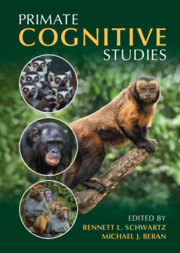Book contents
- Primate Cognitive Studies
- Primate Cognitive Studies
- Copyright page
- Contents
- Figures
- Tables
- Contributors
- Acknowledgments
- 1 The Purpose of Primate Cognitive Studies
- 2 A History of Primates Studying Primates
- 3 Genetic and Environmental Influences on Chimpanzee Brain and Cognition
- 4 The Evolution of Cognition in Primates, Including Humans
- 5 State of the Field
- 6 Current Perspectives on Primate Perception
- 7 The Comparative Study of Categorization
- 8 Numerical Cognition in Nonhuman Primates
- 9 The Natural History of Primate Spatial Cognition
- 10 Progress and Prospects in Primate Tool Use and Cognition
- 11 Sequencing, Artificial Grammar, and Recursion in Primates
- 12 The Evolution of Episodic Cognition
- 13 Metacognition
- 14 Bridging the Conceptual Gap between Inferential Reasoning and Problem Solving in Primates
- 15 The Eyes Have It
- 16 Social Cooperation in Primates
- 17 Primate Communication
- 18 Theory of Mind in Nonhuman Primates
- 19 A Requiem for Ape Language Research
- 20 Primate Empathy
- 21 Replication and Reproducibility in Primate Cognition Research
- 22 Ethical Considerations in Conducting Primate Cognition Research
- 23 Collaboration and Open Science Initiatives in Primate Research
- 24 Studying Primate Cognition
- 25 Do Monkeys Belong in the Ape House?
- Index
- References
2 - A History of Primates Studying Primates
Published online by Cambridge University Press: 28 July 2022
- Primate Cognitive Studies
- Primate Cognitive Studies
- Copyright page
- Contents
- Figures
- Tables
- Contributors
- Acknowledgments
- 1 The Purpose of Primate Cognitive Studies
- 2 A History of Primates Studying Primates
- 3 Genetic and Environmental Influences on Chimpanzee Brain and Cognition
- 4 The Evolution of Cognition in Primates, Including Humans
- 5 State of the Field
- 6 Current Perspectives on Primate Perception
- 7 The Comparative Study of Categorization
- 8 Numerical Cognition in Nonhuman Primates
- 9 The Natural History of Primate Spatial Cognition
- 10 Progress and Prospects in Primate Tool Use and Cognition
- 11 Sequencing, Artificial Grammar, and Recursion in Primates
- 12 The Evolution of Episodic Cognition
- 13 Metacognition
- 14 Bridging the Conceptual Gap between Inferential Reasoning and Problem Solving in Primates
- 15 The Eyes Have It
- 16 Social Cooperation in Primates
- 17 Primate Communication
- 18 Theory of Mind in Nonhuman Primates
- 19 A Requiem for Ape Language Research
- 20 Primate Empathy
- 21 Replication and Reproducibility in Primate Cognition Research
- 22 Ethical Considerations in Conducting Primate Cognition Research
- 23 Collaboration and Open Science Initiatives in Primate Research
- 24 Studying Primate Cognition
- 25 Do Monkeys Belong in the Ape House?
- Index
- References
Summary
When George John Romanes published his book Animal Intelligence in 1882, marking for many the beginning of the study of comparative cognition, he devoted chapter 17 to the mental life of “Monkeys, Apes, and Baboons.” His subsequent experiments on the mental powers of zoo chimpanzees would be published in Science (Romanes, 1889) and Nature (Romanes, 1890). Around the turn of the last century, Edward Thorndike of Columbia University and A. J. Kinnaman of Clark University conducted laboratory studies on the intelligence of capuchin and rhesus monkeys, respectively. Thus, from psychology’s earliest days as an experimental science, nonhuman primate cognition was a focus of interest and investigation. Many of the best-known and most influential psychologists in history – names like Watson, Yerkes, Köhler, Harlow, Lashley, Hebb, Premack, Rumbaugh, and countless others – made significant contributions to our understanding of learning and cognition through studies of monkeys and apes. Although the history of cognitive research with nonhuman primates is too long and too rich to be reviewed exhaustively in one chapter, the present introduction will highlight significant research themes and important milestones across the history of primate cognition research. The goal of this review is to show how contemporary comparative cognition research is intricately connected to its history, and how our understanding of primate cognition shows cumulative progress across the last 140 years of inquiry.
- Type
- Chapter
- Information
- Primate Cognitive Studies , pp. 12 - 28Publisher: Cambridge University PressPrint publication year: 2022

